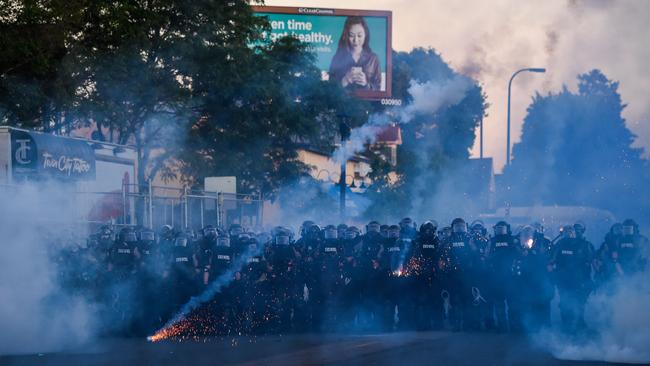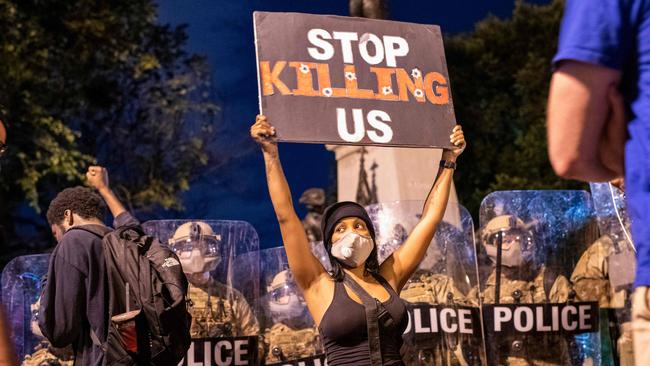George Floyd riots: ‘If cops stopped killing us, we wouldn’t burn city’
As the sun set in battle-scarred Minneapolis, two markedly different demonstrations were taking place.

As the sun set in battle-scarred Minneapolis, two markedly different demonstrations were taking place.
Outside the Cup Foods delicatessen, the spot where George Floyd, 46, an unarmed black man, died last week after a white police officer knelt on his neck for more than eight minutes, gospel music and barbecue smoke filled the air. Flowers and teddy bears carpeted the ground and the walls were covered in murals.
“This is a celebration of George Floyd’s life. I’m sending out only positive vibes,” said Glen Walton, handing out free hotdogs and burgers. “It’s a painful, trying time but we have to be hopeful.”
On Thursday night, protesters burnt down a police station and set fire to 170 buildings. Shops were looted, cars were burnt, property was smashed. The killing of Floyd triggered race-infused violence and deadly riots across America.
By Friday evening no one outside Cup Foods wanted further destruction. The crowd chanted Floyd’s name and warned that the violence and looting were distracting from the fight for justice.
“The rioters aren’t going to do nothing. Destroying the property — that’s ignorance. I’m not going to entertain ignorance. Floyd wouldn’t have wanted that,” said the dead man’s cousin, Emanuel Justice, 40, who had travelled from the family’s home in Houston, Texas.
Ten minutes’ drive away, however, the mood was darker. In the Third Precinct, epicentre of the violence, the streets were strewn with rubble and torched buildings still smouldered. The air was hazy with smoke, teargas and the smell of burning rubber.
Minnesota Governor Tim Walz had declared a state of emergency and called in the National Guard, who stood in heavily armed ranks supported by armoured cars that blocked off the roads. A gang of screaming rioters forced a group of them to retreat down the street to their trucks. Sirens blared in the distance as a fourth night of fury erupted.
As more protesters arrived on huge motorbikes, furiously revving their engines, police in riot gear emerged to support the National Guard.
The 8pm curfew, brought in across the state, came and went. Demonstrators continued to clash with the police, who used plastic bullets, concussion grenades and teargas. Officers fired from an overpass as the protesters lobbed rocks and bottles of water.
Hundreds of protesters yelled the now familiar chants of “I can’t breathe” and “Hands up, don’t shoot”.
Seeking to explain the violence, Antonio, 30, said: “It’s so crazy that we have to do this to get our words through. It should go down like this every time they kill an innocent black person. If they stopped killing us, we wouldn’t have to burn the city like this. But until they realise what they’ve been doing to us for so long this is what’s going to happen.”
Another demonstrator said: “You can only ask for people to beg for their lives for so long before we’re going to be angry and fight for our f..king lives.”

As Minneapolis erupted, a federal protective officer was fatally shot in Oakland, California, as thousands of demonstrators overwhelmed the streets on Friday night. In Washington, the White House went into lockdown as demonstrators tried to scale the walls; in Atlanta, Georgia, violent chaos erupted; in Detroit, Michigan, a 19-year-old protester was shot dead by another civilian.
On Saturday, as it emerged that a petrol station, a post office, a bank and a restaurant had been burnt in Minneapolis overnight, Waltz told a press conference: “Let’s be very clear. The situation in Minneapolis is no longer in any way about the murder of George Floyd. It is about attacking civil society, instilling fear and disrupting our great cities.”
The governor did not rule out bringing in the military. “Quite candidly, right now, we do not have the numbers,” he said. “We cannot arrest people when we’re trying to hold ground because of the sheer size, the dynamics and the wanton violence that’s coming out there.”
Asked if he was aware of rumours that white supremacists had joined some of the looting, Mr Walz said that based on “my suspicions and what I’ve seen on this, yes”. He added: “It gets worse than that. The cartels, who are wondering if there was a break in their drug transmissions, are trying to take advantage of the chaos.”
According to Melvin Carter, the mayor of Minneapolis’s “twin city”, Saint Paul, all the people arrested there on Friday night were not local. “Those folks who are agitating and inciting are taking advantage of the pain ... that so many of our community members feel,” he said.
An early autopsy found Floyd did not die of strangulation or asphyxiation and referred to “underlying health conditions”.
The Sunday Times



To join the conversation, please log in. Don't have an account? Register
Join the conversation, you are commenting as Logout